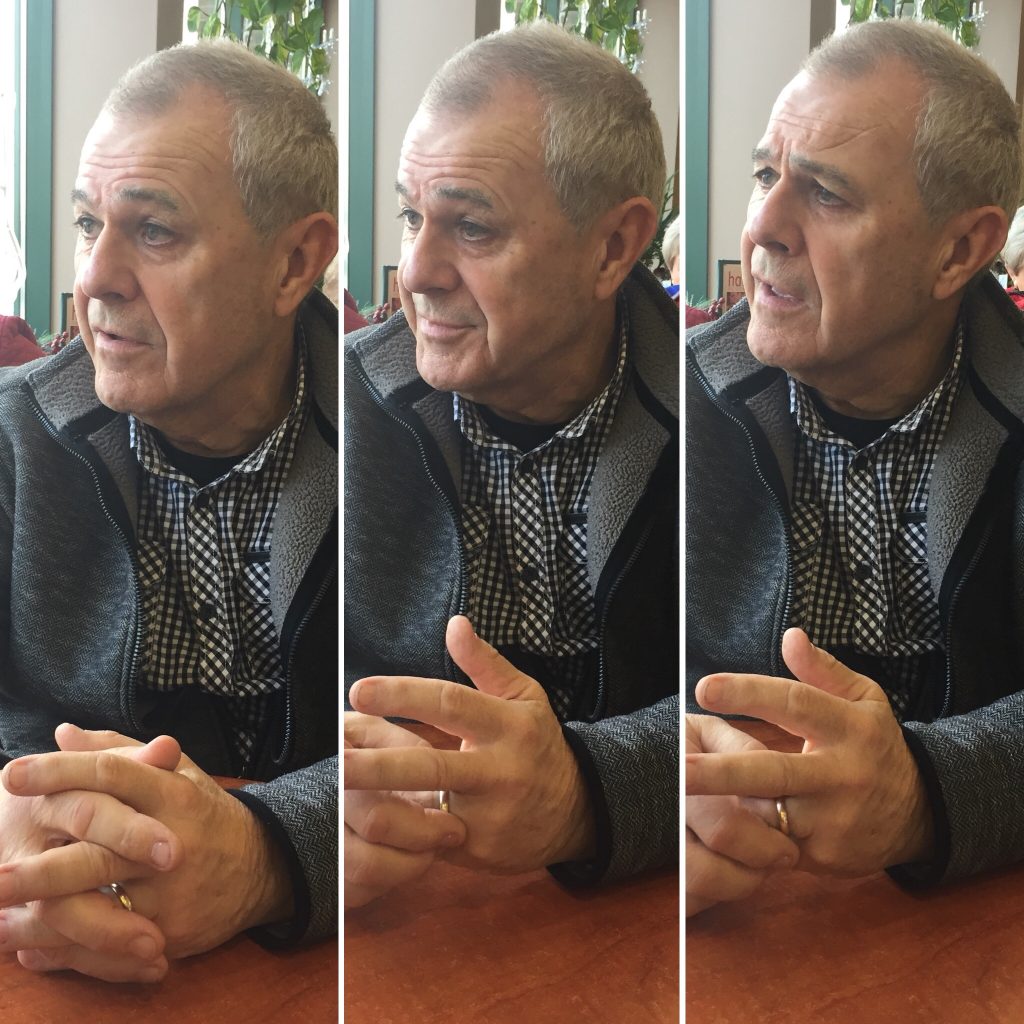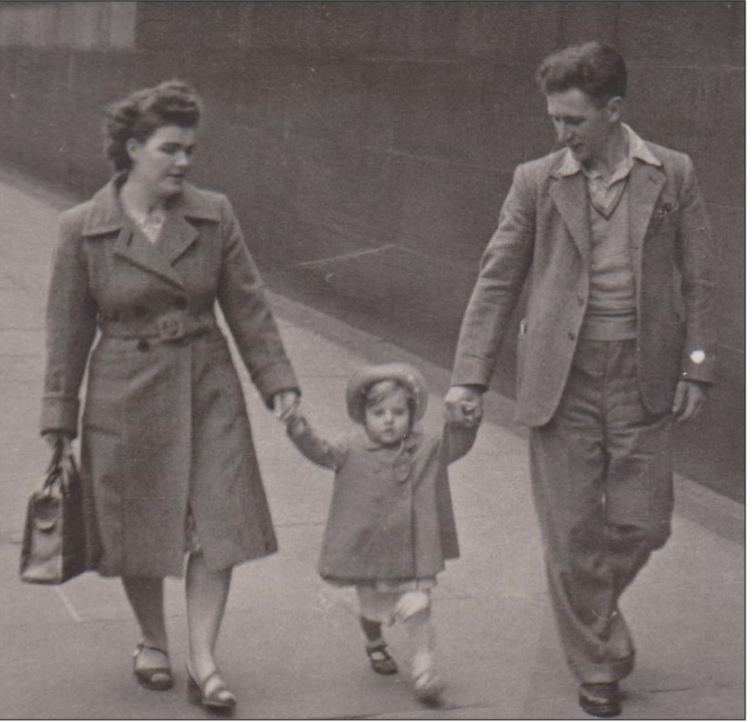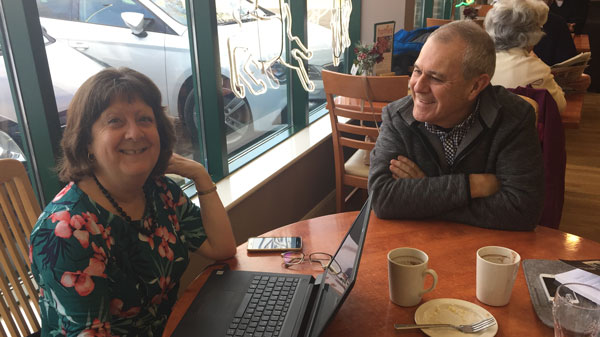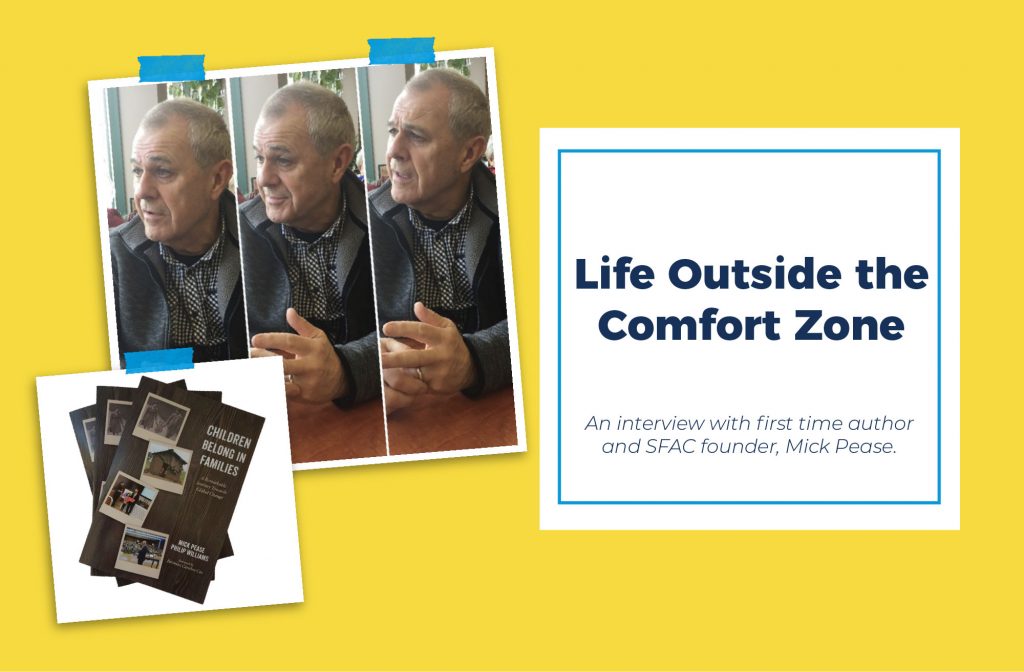Mick Pease talks about following his calling, stretching his own belief in what he could achieve… and becoming an author.
Your book, Children Belong in Families, is now officially out. How does it feel to be a published author?
Weird – it feels really weird. I am proud of it and of what I have achieved, although I never realised there was a story there to be told. It started with suggestion from people I worked with over the years from Brazil to Uganda to Myanmar all saying same thing – I should write a book. Then an old friend Phil Williams contacted me who became my co-author. He is a published poet but had never written a book before – so I spoke it and he wrote it. Then he found an American publisher who was keen straight away, and it started from there. It’s really not something I ever expected to do.
What would you say was your aim in setting out the story of SFAC?
To re-purpose churches and organisations looking after vulnerable children to consider family-based care options including foster care instead of institutional care and to do it without being judgmental of what they already have in place. Essentially to encourage people to ask questions of themselves and their work with vulnerable children. I’m hoping that those who support orphanages have a ‘light bulb moment’ after reading about what are the real needs of children and what are the best ways of meeting their individual needs. We’ve all made the mistakes over years don’t let’s keep making those same mistakes.

So is that the underlying philosophy of SFAC?
Yes, the underlying philosophy is that wherever possible and safe children belong in families and not institutional care. We realise that for some children a family may not be possible for a number of reasons but let’s make sure we have truly examined all the options with the parents, extended and family foster care before we resort to placing children into orphanages. Where organisations already have orphanages or children’s homes we try to enlighten them and their donors about the more effective ways of supporting vulnerable children and families.
SFAC’s approach is to ‘win’ people over rather than condemn or criticise. We like to build on strengths and help them develop better programmes. We don’t take the view that residential care is always bad for children, for some children it is necessary, but such a children’s home should be small, have trained, qualified and supervised staff with the right ratios of children. It’s always about the child’s needs first and foremost. Not our needs and not the needs of the organisation or the donors.
We also help those organisations who are interested in setting up family based care programmes that protect children and families and wish to avoid the traditional orphanage care route.
Importantly, we want to be available to all organisations regardless of size and budget – this means finding ways of covering costs for small, grassroots charities who would never normally be able to access the kind of training SFAC offers. Our donors make this possible.
Were there areas where you felt you had to tread carefully in telling this story?
It was very important not to condemn anyone who had started their work with vulnerable children in good faith. People have worked within, and donated money to, approaches which could be seen as dubious, but have done so in good faith and that needs to be respected. We have all acted naively at some time in our life. A lot of people want to know why they should change systems they have been working with for years or why they should consider starting something different – winning them over by understanding the issues is how we effect change. And that is what I call ‘the ripple effect’ – although that does not always translate well into other languages! It’s about throwing a pebble into the water by introducing ideas to workers in the field who will then pass them on to all those they come into contact with, not just other professionals but family, community and friends, places people like me will never reach. It was important to acknowledge these informal networks and the different ways in which systems operate. It’s about changing generational mindsets about the value of children.
Where does Christianity fit into what you and what SFAC are trying to achieve?
SFAC is not a Christian charity, but we have a strong Christian ethos. That said, we work equally well with people who don’t have the same faith but who understand the purpose and intention behind our faith. It’s about mutual respect. This is not about bringing people or their children to Jesus. We have had Christian workers ask if we are saying that it is better to put a child in a Muslim family than in a Christian orphanage, and the answer is “Yes”. It is really vital to understand that the child is the centre of what we do – not the faith, not the organisation, not the social worker – the child. It is their life, their family, their community, their future we are affecting and what we say and do will be with them for the rest of their lives. We must take this responsibility seriously.
With that in mind, what is your principal hope for the book?
Of course, I am hoping that people find it a good an enjoyable read, but my main focus is changing hearts and minds about how we look after vulnerable children. I would love to think this book could really make a mark for years to come in how people view separating children from their families without good reason and taking all their emotional foundations and origins away from them. At worst, for some children it can destroy their life, for others they will overcome but will still carry those emotional scars for the rest of their life. If I can in some way influence the global community that well developed, family based care programmes are a much more natural, healthier and even, where appropriate, biblical way to look after children that would be wonderful.
Parts of the book deal with your own childhood and family background, particularly your older sister who was in residential care. How do you feel about that and why was including it significant?
I had never previously thought about how my sister Pam’s situation had influenced my motivation. She had chronic asthma after she was born and the medical advice our parents received was clear – that she would have died in the grimy industrial town where we lived. It was such a dirty environment with much industry just after the 2nd World War ended. She was away from home for about four years and remembers leaving home when I was “a babe in arms”. I never saw her for almost 4 years. She was in a children’s home for supposed medical care, but she was the only one on her ward who came out alive and she could never tell Mum and Dad what happened there. They got to hear about her ordeal shortly before they died. Imagine how that made them feel about the decision they made to permit her to leave home under medical advice.
Hopefully the personal stuff illustrates the story and why I have reached the place I am at. I’m pleased that it has a meaningful purpose and that there is a much bigger point in there than just my story – it’s about changing hearts and minds about how they respond to the vulnerable children they care for.

Mick’s sister, Pam, walking with their parents.
How else do you think your own background led you to this point, and what were the sacrifices and challenges along the way?
I would describe it as a sense of calling. I never knew that unqualified people like me with little ambition could achieve anything. Growing up I was often told I would amount to nothing by my extended family. I was trouble and a rogue. But then, if I started to be more positive and self-assured told quite firmly that “pride cometh before a fall” and not to get above “my station”. No wonder I always saw myself as a number two, a helper – never as a leader.
I started working life as a miner, the last place my mother wanted me to work but was at the time secure employment although that was to change. The biggest sacrifice was after 10 years leaving mining and selling our first house to go to Bible college prior to all of this. I had no idea where it was all heading except for the sense of calling, but it got me to study and then to have the confidence to go for social work training. Leaving the pit was a huge commitment at that stage of my life, married, a young parent of two small children leaving family, community and friends. It was only my faith that made it happen. It seems that I have spent lots of my life living outside my comfort zone – and I can’t really explain why just that it feels that way.
And the effect on your family life?
Brenda and I had been married 26 years when we first went out to Brazil to work, and thankfully our two sons Mark and Kevin had both grown up by the time we started travelling abroad regularly. During our 12 months in Brazil Brenda did struggle more than I did with the emotional loss of family and with being abroad and so on. It was all a huge a leap of faith.
What do you think the book will give them?
I am thrilled that my sons will know me more through it, and my grandchildren in due course even if they are not interested right now. They know about “grandad’s book” and there will be a legacy impact. That ties in with the whole general purpose – children in orphanages lose that personal legacy once separated from their origins that would have come to them through all the family stories, and life often is about the power of a story, your life, your family, your community, your friends, your own purpose and opportunities in life.
So, what next for Mick Pease and for SFAC?
Well, unlike most I’ve spoken to in this line of work, I’ve never had a plan, this has been a journey of ongoing faith and being stretched! I’ve never been sure how to recognise success and I’ve never planned for it although obviously I wanted it to succeed. But SFAC is now becoming a more multi-disciplinary organisation and there are others who have to take it on. There is a huge global movement towards change and SFAC has been a part of that for 20 years. But not only us, there were a few others saying similar things around that time, but I have to say I often felt like a lone voice early on. But now, many other organisations are adopting the same approach, family first and it’s become a more positive and supportive environment to work in. I don’t see myself retiring yet, this has never been a job to me rather a way of life. So I always anticipate some involvement – but also some letting go has to happen.
Visit www.childrenbelonginfamilies.net to get your hands on a copy of the book.

Interview conducted by Mary Jolley, retired social worker and former journalist.

